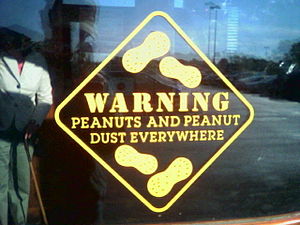Peanut allergies
| Peanut allergy | |
|---|---|
 |
|
| A peanut allergy warning | |
| Classification and external resources | |
| ICD-10 | T78.4 |
| ICD-9-CM | 995.61, V15.01 |
| DiseasesDB | 29154 |
| MeSH | D021183 |
Peanut allergy is a type of food allergy to peanuts. It is different from nut allergies. Physical symptoms of allergic reaction can include itchiness, urticaria, swelling, eczema, sneezing, asthma, abdominal pain, drop in blood pressure, diarrhea, and cardiac arrest.Anaphylaxis may occur.
It is due to a type I hypersensitivity reaction of the immune system in susceptible individuals. The allergy is recognized "as one of the most severe food allergies due to its prevalence, persistency, and potential severity of allergic reaction."
Prevention may be partly achieved through early introduction of peanuts to the diets of pregnant women and babies. The principal treatment for anaphylaxis is epinephrine as an injection.
In the United States, peanut allergies are present in 0.6% of the population. In Western cultures, peanut allergy is the most common cause of food-related anaphylaxis death.
Symptoms of peanut allergy are related to the action of Immunoglobulin E (IgE) and other anaphylatoxins which act to release histamine and other mediator substances from mast cells (degranulation). In addition to other effects, histamine induces vasodilation of arterioles and constriction of bronchioles in the lungs, also known as bronchospasm. At least 11 peanut allergens have been described.
...
Wikipedia
